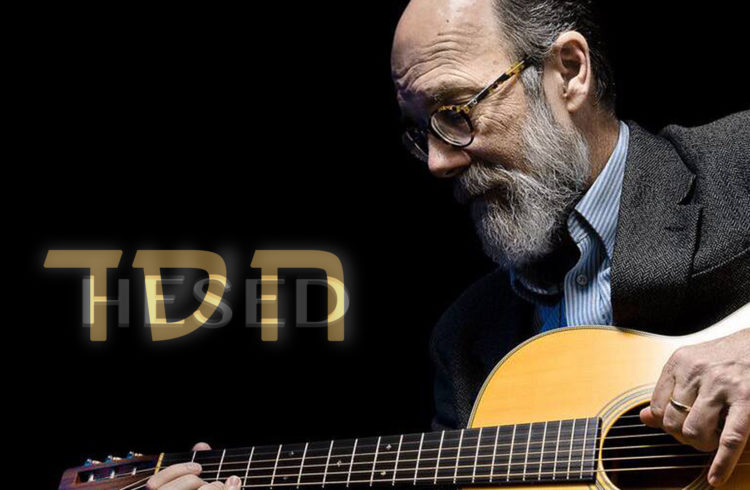
People often say, God is love. But when you think of God’s love, what does that mean to you?
My guest is Michael Card, author of the new book Inexpressible: Hesed and the Mystery of God’s Lovingkindness. Card calls hesed the “greatest sacramental word in the Hebrew Bible.” It’s an untranslatable word that defines an inexpressible mystery.
We have no English word to adequately describes hesed, yet it’s a word that God uses to describe himself. It’s an incredibly transformational word. Mike and I talk about how hesed changes us and how it heals our world.
Hesed is part of God’s image in us. I’m created to experience God’s kindness. And there’s a part of us that resonates when someone shows us that unexpected kindness. @MichaelCard Click To Tweet Michael Card is a well beloved author and songwriter. You may have heard his classic songs Immanuel or El Shaddai. You may even have some of his thirty-one albums! But did you know that he is also a prolific author and biblical scholar? He has written or contributed to more than twenty-four books.
Michael Card is a well beloved author and songwriter. You may have heard his classic songs Immanuel or El Shaddai. You may even have some of his thirty-one albums! But did you know that he is also a prolific author and biblical scholar? He has written or contributed to more than twenty-four books.
Card is a graduate of Western Kentucky University with a bachelor’s and master’s degree in biblical studies. He also teaches the bible in a variety of settings and he serves as mentor to many younger artists and musicians. Michael Card lives in Franklin Tennessee with his wife and four children.
God created the world to so he could show it his kindness. And I think further on down you realize that’s how you heal the world is by being kind. And not just doing nice things but all the implications of hesed. I’m going to love people who are unloveable. I’m going to love my enemy. That’s what heals things.
This Podcast relies on shares & reviews from listeners like you!
Subscribe/Rate/Review Betwixt on iTunes!
Learn more about the podcast at betwixtpodcast.com
Links:
- Visit Michael Card’s website
- Read Michael Card’s latest book: Inexpressible: Hesed and the Mystery of God’s Lovingkindness
- Listen to the companion album: To The Kindness of God
- Listen to Michael Card’s Podcast: In the Studio
Other Episodes You Will Enjoy:
12 Sex Trafficking (Part 1): CATCH Court with Hannah Estabrook
10 Embracing Your Daughter’s Killer: The Freedom of Radical Forgiveness with Joel Kime
Music:
Special thanks to Michael Card for the generous use of the music you heard on this episode:
- The Shelter of the Shadow
- I Will Be Kind
- Job Suite
- Prelude 128
- My Help (Psalm 121)
- That Kind of Love
- When Dinah Held My Hand
- Meditation 4 Selah
- Poem of Your Life
Register for the Roundtable Book Discussion: How the Body of Christ Talks
In our polarized political and social climate, it’s difficult to have meaningful yet life-giving conversations with those we disagree with. This 4 week virtual group will explore how church communities can be training hubs where hesed we can be flesh out by the way we talk with and listen to one another with kindness and compassion.


Missio Alliance Comment Policy
The Missio Alliance Writing Collectives exist as a ministry of writing to resource theological practitioners for mission. From our Leading Voices to our regular Writing Team and those invited to publish with us as Community Voices, we are creating a space for thoughtful engagement of critical issues and questions facing the North American Church in God’s mission. This sort of thoughtful engagement is something that we seek to engender not only in our publishing, but in conversations that unfold as a result in the comment section of our articles.
Unfortunately, because of the relational distance introduced by online communication, “thoughtful engagement” and “comment sections” seldom go hand in hand. At the same time, censorship of comments by those who disagree with points made by authors, whose anger or limited perspective taints their words, or who simply feel the need to express their own opinion on a topic without any meaningful engagement with the article or comment in question can mask an important window into the true state of Christian discourse. As such, Missio Alliance sets forth the following suggestions for those who wish to engage in conversation around our writing:
1. Seek to understand the author’s intent.
If you disagree with something the an author said, consider framing your response as, “I hear you as saying _________. Am I understanding you correctly? If so, here’s why I disagree. _____________.
2. Seek to make your own voice heard.
We deeply desire and value the voice and perspective of our readers. However you may react to an article we publish or a fellow commenter, we encourage you to set forth that reaction is the most constructive way possible. Use your voice and perspective to move conversation forward rather than shut it down.
3. Share your story.
One of our favorite tenants is that “an enemy is someone whose story we haven’t heard.” Very often disagreements and rants are the result of people talking past rather than to one another. Everyone’s perspective is intimately bound up with their own stories – their contexts and experiences. We encourage you to couch your comments in whatever aspect of your own story might help others understand where you are coming from.
In view of those suggestions for shaping conversation on our site and in an effort to curate a hospitable space of open conversation, Missio Alliance may delete comments and/or ban users who show no regard for constructive engagement, especially those whose comments are easily construed as trolling, threatening, or abusive.